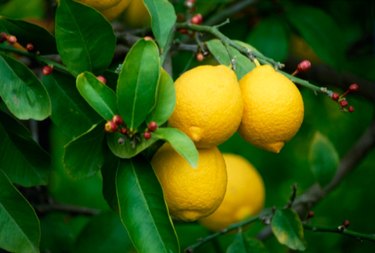
Citrus trees typically grow in warm climates where insects abound. These insects are typically noticed during the spring, when trees are developing new shoots and leaves. Two types of tiny, black bugs often found on citrus trees are spider mites and aphids, both of which feed on plant leaves with threadlike mouth parts.
Types
Video of the Day
Spider mites are common pests of citrus trees, as well as many other plants, flowers and shrubs. These tiny pests come in a wide range of colors including black, red, brown and green. Spider mites have eight legs and are not considered insects, but relatives of spiders. Populations of this mite is highest on citrus trees during the spring and fall. Aphids are another pest commonly found on citrus trees. These insects are quite small and usually an odd pear shape. Aphids can be found in bold colors such as red, pink, yellow or green or in more muted shades of black and brown.
Video of the Day
Effects
Spider mites feed on citrus leaves and fruit causing them to appear stippled or bronzed. Citrus fruit infested with spider mites may develop a brown stain and fruit may be much smaller than normal at harvest time. Spider mite feeding usually causes citrus fruit to become sweeter. This is because spider mite feeding extracts a large portion of water from the fruit, making fruit sugar more concentrated. Aphid feeding causes citrus leaves to become flecked or speckled, distorted and plant stems may curl. Aphids feed on plant sap from leaves, which causes them to excrete a clear, sticky liquid called honeydew. The presence of honeydew causes a fungal condition known as sooty mold to develop on citrus trees. Sooty mold fungi is black, crusty and looks similar to soot.
Cultural Control
Citrus trees infested with spider mites and aphids may benefit from syringing. This is the process of spraying your trees with a hard stream of water. Syringing your citrus trees twice each week, removes bugs from the tree and keeps them under control. Washing your citrus tree with a homemade soap mixture can reduce insects, as well. Combing one tablespoon liquid dish soap with one quart of water and wash your tree. Concentrate on the undersides of plant leaves, where most sucking pests such as spider mites and aphids gather to feed.
Chemical Controls
Soft insecticides such as horticultural oils are often an effective means of insect control on citrus trees. Horticultural oils must come into contact with insects to kill them, so be sure to completely cover your tree when applying the oil.Sooty mold fungi is easier to remove after horticultural oils are used. Spider mites may require stronger chemical control products, such as miticides.